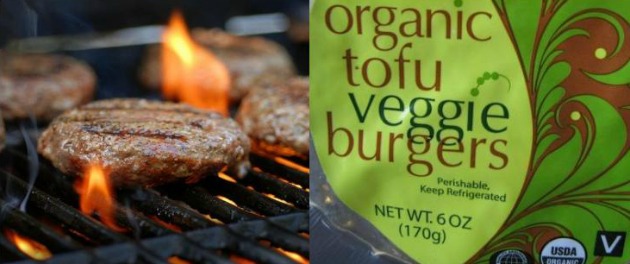 It’s barbecue time, and scare stories are already in the news about the dangers of cooking meat, fish and poultry on the grill. Most of those warnings concern the formation of carcinogens and mutagens known as heterocyclic amines (HCAs) during the grilling process.
It’s barbecue time, and scare stories are already in the news about the dangers of cooking meat, fish and poultry on the grill. Most of those warnings concern the formation of carcinogens and mutagens known as heterocyclic amines (HCAs) during the grilling process.
While it’s probably wise to enjoy barbecue meat such as char-broiled steaks and blackened catfish only as an occasional special treat, these news reports leave out a very important fact.
The greatest danger from heterocyclic amines (HCAs) is not from barbecue meat or grilled steaks. Rather, it is from processed and packaged protein foods including veggie burgers and other approxi-meats.
Industrially processed proteins derived from soy, corn, wheat and other grains contain plenty of HCAs, and the levels only increase with the addition of flavor enhancing soy sauces and marinades.
It’s myth that HCAs are mostly found in fried or grilled beef, poultry and fish. The truth is that HCAs are formed in any pyrolyzed, protein-rich food. For example, soy protein plus sugar subjected to high heat and pressure at the processing plant ends up with potent mutagens such as 2-amino-9H-pyrido (2,3-b) indole and 2-amino-3-methyl-9H-pyrido (2,3-b) indole.
All commercial soy sauces come right out of the bottle with HCAs known as 1-methyl-1,2,3,4-tetrahydrobeta-carboline-3-carboxylic acid (MTCCA). When we add sugar to soy sauce — a combination found ready made in many marinades and barbecue sauces — even more heterocyclic amines are formed.
The beta carbolines found in commercial ketchups and fish sauces also spur the formation of additional HCAs.
In brief, the higher the heat and pressure and the longer the duration, the more HCAs are formed. Combine with sauces and other ingredients high in HCAs, heat again and even more are formed.
Because modern plant protein products such as textured vegetable protein (TVP) and soy protein isolate (SPI) may undergo three or more heat treatments before they reach the supermarket or health food store, they can carry high levels of HCAs. These industrially processed foods are likely to contain much higher levels of HCAs than real foods prepared at home.
The more types of HCAs found in a given product or meal, the greater the risk. As T. Sugimura of the National Cancer Center Research Institute in Tokyo puts it:
“Heterocyclic amines are probably involved in the development of human cancer in the presence of other carcinogens, tumor promoters and factors stimulating cancer progression. HCAs most affect the liver, but lung and stomach tumors, lymphomas, leukemias and myocardial lesions also occur.”
Should we be worried about HCAs?
The short answer is “yes.”
HCAs appear naturally in the body, but never in the quantities provided by today’s overly — and repeatedly — heated food products. In animal studies, mutagenic HCAs are most likely to turn carcinogenic when eaten regularly rather than sporadically. HCAs are also most likely to trigger human cancer in the presence of other carcinogens. Thus the consistent presence of nitrosamines, MSG and HCAs in heavily processed plant protein foods poses a triple threat.
To date most of the news stories on HCAs has centered on grilled and barbecue meat, fish and poultry. Grilled tempeh and tofu would probably gain some HCAs this way as well.
The real danger though is not from putting traditional real foods such as meat, poultry, fish, tempeh or tofu on the barbie, but eating industrially processed plant proteins. HCAs do pose health risks, but most are formed at the processing plant, not in the home kitchen or on the patio.
Sources
For an extensive discussion of the research on HCAs in soy and other highly processed industrial foods and a list of citations, read Chapter 11 of The Whole Soy Story: The Dark Side of America’s Favorite Health Food (New Trends, 2005).








What about Bragg’s Liquid Aminos as a Soy Sauce substitute? It was recommended to me, but since it is still a soy product, I’m a little uncomfortable with it.
If you do not barbecue over direct high heat, meaning that the meat is never directly over the heat source, HCAs will not be formed in your barbecued meat. Our ancestors did not have cancer epidemics and they cooked in front of fires, not over them, unless the meat was up so high that it never got scorched.
And you do not need grill marks or high heat to have great steaks, if you are cooking grassfed meat. I never barbecue steaks directly over the heat source, and they always turn out great.
OH NO! Don’t eat…at all!
That’s why it’s important to balance it out with a variety of antioxidants from fruit and veggies.
https://www.thehealthyhomeeconomist.com/barbecuing-meat-a-safer-choice-than-packaged-protein-foods/
Good info. Thanks for sharing.
Everything is bad for you. Everything causes cancer. Pick your poison.
We are looking into getting a new barbecue. Is there any health related differences between cooking on a propane barbie vs. a charcoal one?
It seems hard to believe that this ancient form of cooking could be that harmful. I’m sure eating nutrient dense foods along with it help counter act the bad. Just seems like common sense.
I agree, cancer is a modern disease. The ancient art of cooking meat over a wood fire is probably not the cause of any of any of todays epidemics.
Just have to mention here that the term ‘blackened’ when referring to catfish or any other dish, is about spices, not about burning the food. Char broiling my blacken the edges of the steak, but blackened is spice.